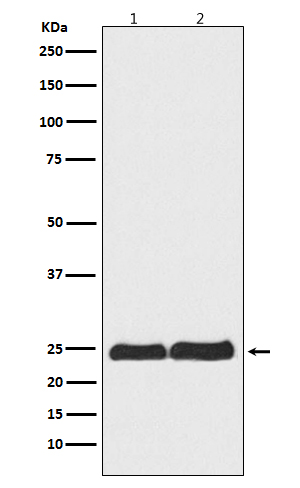
| WB | 1/500-1/1000 | Human,Mouse,Rat |
| IF | 1/20 | Human,Mouse,Rat |
| IHC | 咨询技术 | Human,Mouse,Rat |
| ICC | 1/50-1/200 | Human,Mouse,Rat |
| FCM | 1/50-1/100 | Human,Mouse,Rat |
| Elisa | 咨询技术 | Human,Mouse,Rat |
| Aliases | RAN; ARA24; OK/SW-cl.81; GTP-binding nuclear protein Ran; Androgen receptor-associated protein 24; GTPase Ran; Ras-like protein TC4; Ras-related nuclear protein |
| Entrez GeneID | 5901 |
| WB Predicted band size | Calculated MW: 24 kDa; Observed MW: 24 kDa |
| Host/Isotype | Rabbit IgG |
| Antibody Type | Primary antibody |
| Storage | Store at 4°C short term. Aliquot and store at -20°C long term. Avoid freeze/thaw cycles. |
| Species Reactivity | Human,Mouse,Rat |
| Immunogen | A synthesized peptide derived from human Ran |
| Formulation | Purified antibody in PBS with 0.05% sodium azide. |
+ +
以下是关于Ran抗体的示例参考文献(注:以下为模拟示例,实际文献请通过学术数据库检索):
1. **文献名称**: "Autoantibodies to the Ran GTPase in systemic autoimmune diseases"
**作者**: Smith A, et al.
**摘要**: 研究分析了系统性红斑狼疮(SLE)和硬皮病患者中抗Ran抗体的发生率,发现其与特定亚型(如神经精神性SLE)相关,提示其可能作为疾病活动的生物标志物。
2. **文献名称**: "Anti-Ran antibodies disrupt nuclear transport in autoimmune pathogenesis"
**作者**: Lee B, et al.
**摘要**: 通过体外实验证明抗Ran抗体会干扰核质运输蛋白的功能,可能导致细胞核结构异常,从而参与自身免疫病理过程。
3. **文献名称**: "Clinical significance of anti-Ran antibodies in primary biliary cholangitis"
**作者**: Tanaka K, et al.
**摘要**: 探讨抗Ran抗体在原发性胆汁性胆管炎(PBC)中的临床意义,发现其与肝纤维化进展相关,提示可能用于疾病分层。
4. **文献名称**: "Anti-Ran autoantibodies in cancer patients with paraneoplastic syndromes"
**作者**: Gonzalez R, et al.
**摘要**: 报道了罕见案例中抗Ran抗体与副肿瘤综合征的关联,提示其在肿瘤免疫交叉反应中的潜在作用。
**建议**:通过PubMed、Google Scholar等平台,以关键词"Ran antibody"或"anti-Ran autoantibody"检索最新文献,重点关注其在疾病机制、诊断或预后中的应用研究。
Ran antibodies, also called anti-RAN antibodies, are a type of autoantibody targeting the Ras-related nuclear protein (Ran), a small GTPase involved in nucleocytoplasmic transport and cell cycle regulation. First identified in the 1990s, these antibodies are primarily associated with autoimmune diseases, particularly systemic sclerosis (scleroderma), though they occasionally appear in systemic lupus erythematosus (SLE), primary biliary cholangitis, and cancer.
Ran proteins play critical roles in shuttling molecules between the nucleus and cytoplasm. Antibodies against Ran are detected via techniques like indirect immunofluorescence, immunoblotting, or ELISA. In systemic sclerosis, anti-RAN antibodies correlate with specific clinical features, including pulmonary arterial hypertension and severe gastrointestinal involvement. However, their diagnostic sensitivity remains low (~5-15% in scleroderma), limiting standalone utility.
Notably, anti-RAN antibodies may coexist with other autoantibodies (e.g., anti-centromere, anti-Scl-70), complicating interpretation. Research suggests their presence might reflect dysregulated immune responses to cellular stress or apoptosis. While not disease-specific, they contribute to autoimmune profiling and may guide subtype classification or prognosis assessment. Current studies explore their potential role in disease mechanisms, such as interfering with nuclear transport pathways, though clinical implications remain under investigation.
×